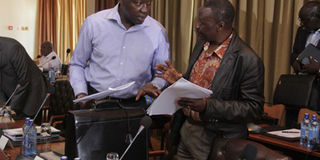Planned oil and gas agency to tighten rules governing sector

Energy and Petroleum Cabinet Secretary Davis Chirchir, (left) and his principal secretary Joseph Njoroge. The stand-off involving three firms that bid for the Sh170 billion Lamu coal-fired power plant is headed for the tribunal that oversees the implementation of public private partnerships, and possibly the courts. FILE PHOTO | NATION MEDIA GROUP
The government will start regulating the activities of companies exploring for oil and gas as it tightens its grip on the emerging sector.
Energy and Petroleum Cabinet secretary Davis Chirchir said a provision for the creation of the upstream regulator has been included in the draft Energy and Petroleum Bill that is set to be tabled before Parliament by September this year.
“The new law will enable us to establish a regulator for upstream that will handle a number of functions, including those related to allocation of blocks,” said Mr Chirchir.
He was speaking on the sidelines of the Local Content Convention held in Nairobi last week, where both government and private sector players discussed how local people and firms can benefit from the oil and gas sector.
Currently, the energy industry is regulated by the Energy Regulatory Commission (ERC), which was formed in July 2007 following the operationalisation of the Energy Act the previous year.
Separate regulation
Regulation of the upstream oil and gas sector is, however, the preserve of the Ministry of Energy and Petroleum as it falls outside ERC’s mandate.
While ERC is tasked with regulating energy, petroleum and related products, as well as renewable and other forms of energy, this applies to mid and downstream petroleum sectors.
Analysts say there is a need to separate regulation of the upstream and downstream sectors to ensure efficiency.
“It is important that the upstream is regulated separately from the downstream as these two sectors deal with different products and activities,” said Mr George Wachira, the director of Petroleum Focus.
Once in place, the upstream regulator will, among other tasks, track the costs incurred by exploration firms to ensure that only valid costs according to the terms of licensing are recouped once such companies enter into the oil or gas production stage.
It will also be responsible for making sure that licensed companies carry out exploration work in designated blocks, according to the stipulated time to avoid speculation about the resource among firms.
“We would like to see transparent and robust monetary systems developed to ensure that the industry benefits local people,” said Mr Chirchir. Kenya has become a frontier in oil and gas exploration since the first discovery in March 2012.
Tullow Oil Plc, which made the first discovery together with its Canadian partner, Africa Oil Corporation, has indicated that the resource discovered so far meets the minimum threshold for development.
With an estimated 600 million barrels of oil in the South Lokichar area alone and a potential of one billion barrels, Tullow Oil has commenced studies with a view to submitting a development plan to the government by the last quarter of next year.
The energy ministry has also initiated the search for a consultant that will oversee the implementation of a crude oil pipeline linking Hoima in Uganda and the proposed port at Lamu through the Lokichar area.
This success, says Ministry of Energy and Petroleum records, has attracted increased interest in the local blocks from international oil and gas exploration companies.
Last week, Mr Chirchir hinted that the government plans to reverse a policy adopted last year that halted allocation of new licensing of exploration blocks until a review of the current Petroleum (Exploration and Production) Act has been done to “secure more revenue for the government”.
Fifteen blocks are set to be given out to exploration companies in the next round of licensing.





